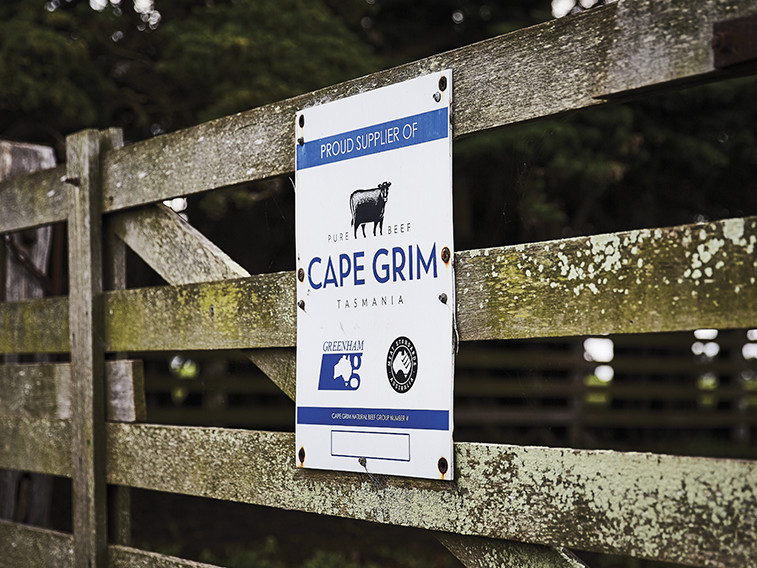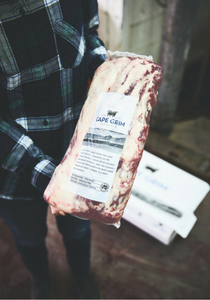Confidence and Conditions Lift


Insight
Cape Grim has carved a definitive space in the premium beef market, offering a grass-fed, mature protein raised in an environment the CSIRO tests as amongst some of the world’s cleanest air.

There are two reasons why Cape Grim’s share of the premium beef market is steadily growing: a distinctive marketing story featuring some of the ‘world’s cleanest’ Tasmanian air, rain and grass, coupled with consummate flavour. Today, less than a decade after its Australian launch, Cape Grim Beef is celebrated by chefs and beef connoisseurs worldwide.
When Victorian sixth-generation meat processors and exporters Peter Greenham and son acquired the Tasmanian Smithton abattoir in 2001, they were surprised by the outstanding quality of the grass-fed beef coming through the facility.
At the time, high-end beef brands were scarce, and the Greenhams identified an opportunity to market a premium, restaurant-grade product, with a developed, rich taste that was unavailable in major supermarkets at the time.
Cape Grim Beef launched in 2007 as a benchmark brand, with its beef sourced from cattle farmers throughout Tasmania, King Island & Flinders Island. Offering a distinct taste, purity and consistent quality, it was set to make its mark on the Australian culinary scene.
Nestled in the far northwest corner of Tasmania, Cape Grim is home to some of the cleanest air in the world, as monitored by the Cape Grim Baseline Air Pollution Station, a joint venture between the CSIRO and the Bureau of Meteorology[1]. And, with around 187 days of clean rain a year, pure green pastures provide abundant grazing for Cape Grim cattle.
It’s these pure Tasmanian origins that sets Cape Grim apart from competitors in Australia and around the world and form the foundations of the brand’s tagline: ‘Pure beef, made from nature’.
Being exclusively grass-fed rather than grain-fed, the cattle’s meat is infused with a unique mineral taste, which is also naturally marbled for maximum juiciness and flavour. Stock maturity is another key difference – with older cattle imparting a more developed flavour to the protein than younger stock traditionally sourced for supermarket meats. The beef is also rigorously graded to meet the four and five star Meat Standards Australia (MSA) tenderness, ensuring Cape Grim supplies a consistent product to chefs around the world.
As Marketing Manager Trevor Fleming explains: “Chefs, fine restaurants, providores and boutique food markets build their careers and their businesses on the quality and reliability of their produce – it’s our business at Cape Grim to deliver that.”
 Beef the last marketing frontier
Beef the last marketing frontierWhen Neil Perry visited Tasmanian farms in the late 2000s, looking for a unique and more developed beef product to serve at his new Sydney Rockpool Bar and Grill, he found Cape Grim the ideal fit.
“Perry set himself apart from other chefs in presenting a rich, grass-fed, more developed flavour to which he could add his own signature,” explains Fleming. “The farmers grow out their cattle to ox weight, resulting in a heavy animal around three years old, so he had the opportunity to supply a lot of that specification.”
Since then, Cape Grim has had a direct relationship with Perry, building a loyal following through his three Rockpool Bar and Grill restaurants throughout Australia. Perry also dry ages the beef in-house, adding his signature to the product and generating more ‘beef buzz’ among connoisseurs.
“Beef was one of the last consumer items to be marketed properly,” argues Fleming. “When chefs and restaurant-owners began calling out the Cape Grim brand on their menu, that was a really important part of not only our brand development but for beef as an industry.”
When it comes to consistent supply and quality, it’s not just great environmental factors behind Cape Grim. It’s data – and lots of it.
Through a new program called ‘Pathways to Market’, led by data solutions firm Sense-T in collaboration with the Tasmanian Institute for Agriculture, Cape Grim Beef is using big data to inform and improve farming processes and marketing. The program aims to provide digitally-backed provenance solutions to Tasmanian food exporters and their supply chains, helping farmers identify what contributes to the quality of their produce. Ultimately it responds to increasing consumer demand to understand exactly where their food comes from, how it was produced and if it’s safe.
© National Australia Bank Limited. ABN 12 004 044 937 AFSL and Australian Credit Licence 230686.